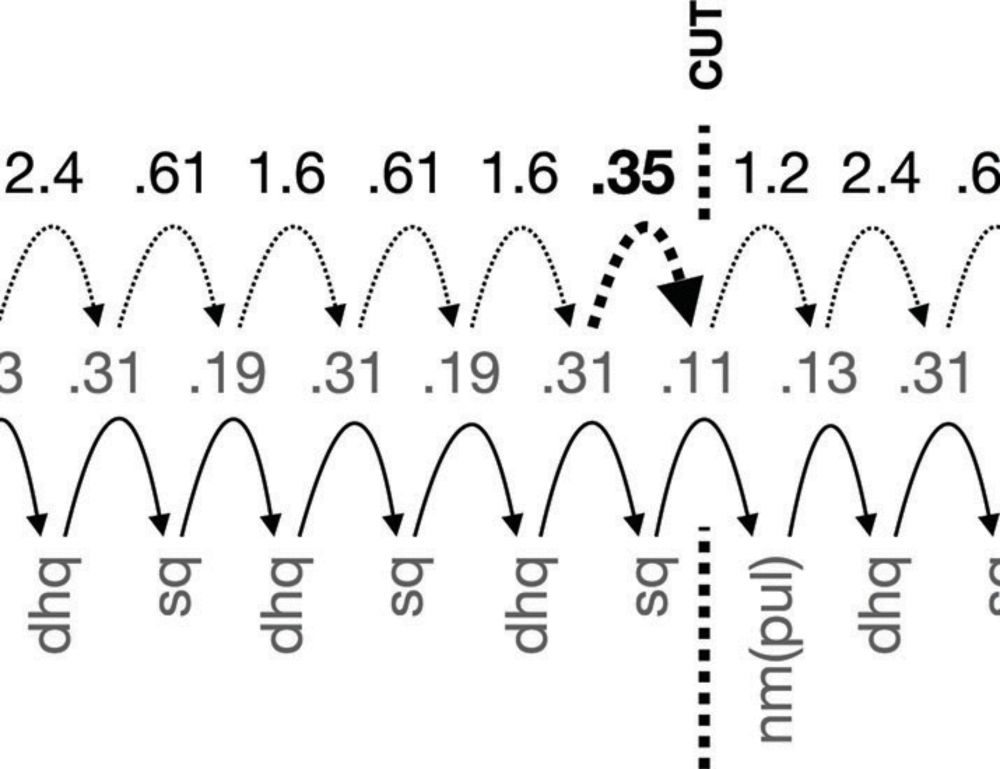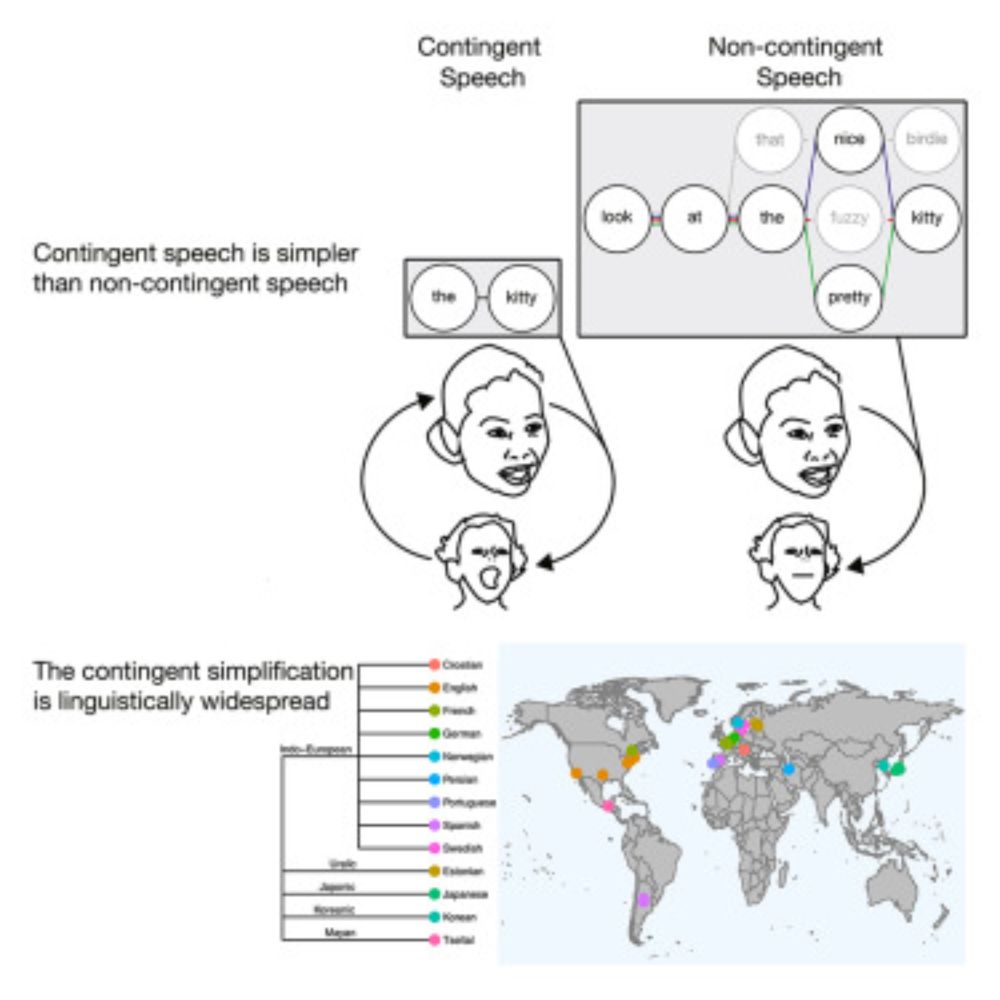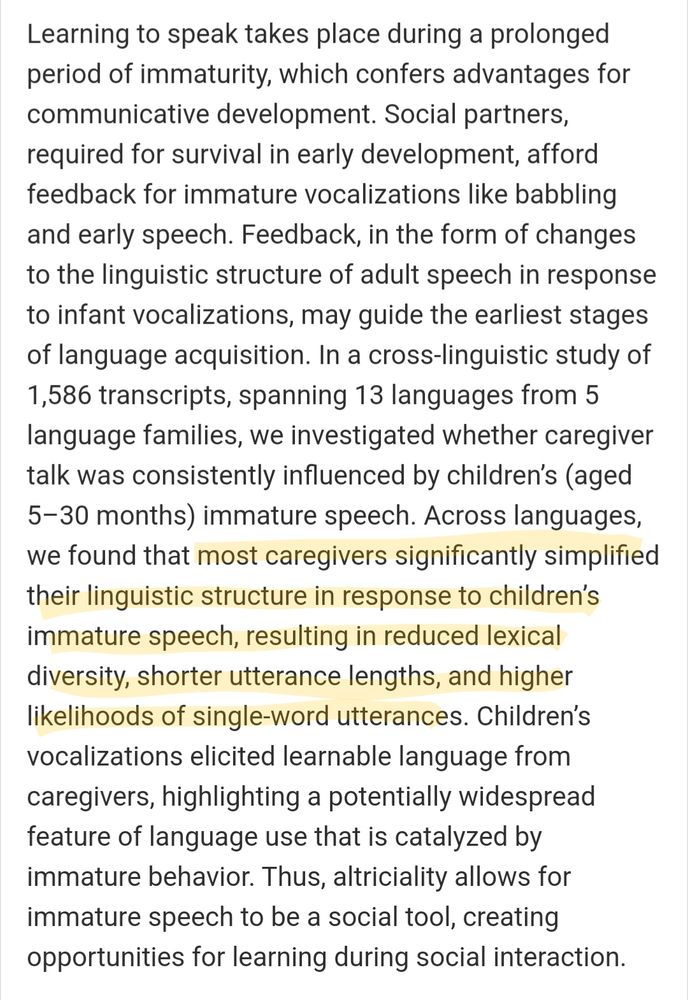
Learning to speak takes place during a prolonged period of immaturity, which confers advantages for communicative development. Social partners, required for survival in early development, afford feedback for immature vocalizations like babbling and early speech. Feedback, in the form of changes to the linguistic structure of adult speech in response to infant vocalizations, may guide the earliest stages of language acquisition. In a cross-linguistic study of 1,586 transcripts, spanning 13 languages from 5 language families, we investigated whether caregiver talk was consistently influenced by children’s (aged 5–30 months) immature speech. Across languages, we found that most caregivers significantly simplified their linguistic structure in response to children’s immature speech, resulting in reduced lexical diversity, shorter utterance lengths, and higher likelihoods of single-word utterances. Children’s vocalizations elicited learnable language from caregivers, highlighting a potentially widespread feature of language use that is catalyzed by immature behavior. Thus, altriciality allows for immature speech to be a social tool, creating opportunities for learning during social interaction.
Cool new paper in @currentbiology.bsky.social — adults simplify their speech specifically in response to immature vocalizations. Seems like an important mechanism for how infant-directed vocalizations work, with a role for language learning
www.cell.com/current-biol...
09.02.2025 20:08 — 👍 21 🔁 3 💬 0 📌 0
We found a non-obvious pathway to robust language learnability across cultures & languages. Future work will assess just how widespread this pathway is across the world’s languages, and the role that contingent simplification plays in language development. 9/9
06.02.2025 16:59 — 👍 1 🔁 0 💬 1 📌 0
Languages don't only become learnable over evolution, they’re also learnable at precise moments during language development. Children actively shape their own learning input, eliciting learnable speech during vocal turn-taking, the central context of language use. 8/9
06.02.2025 16:59 — 👍 1 🔁 0 💬 1 📌 0
Languages must be learnable by the next generation, otherwise they would not exist. Here we show the simplification effect is robust across languages, contexts, and types of social interaction. Contingent simplified speech may be a cross-linguistic key to language learnability. 7/9
06.02.2025 16:59 — 👍 1 🔁 0 💬 1 📌 0

What this cross-cultural robustness implies is that the simplification effect of contingent speech is likely to be present in many more language than the 13 we studied in this paper. 6/9
06.02.2025 16:59 — 👍 1 🔁 0 💬 1 📌 0
A language we studied in this paper—Tseltal Mayan—was a particularly useful test case because Tseltal caregivers don’t use exaggerated child-directed speech typically found in industrialized societies. Despite this, we found a robust simplification in Tseltal caregiver speech. 5/9
06.02.2025 16:59 — 👍 1 🔁 0 💬 1 📌 0
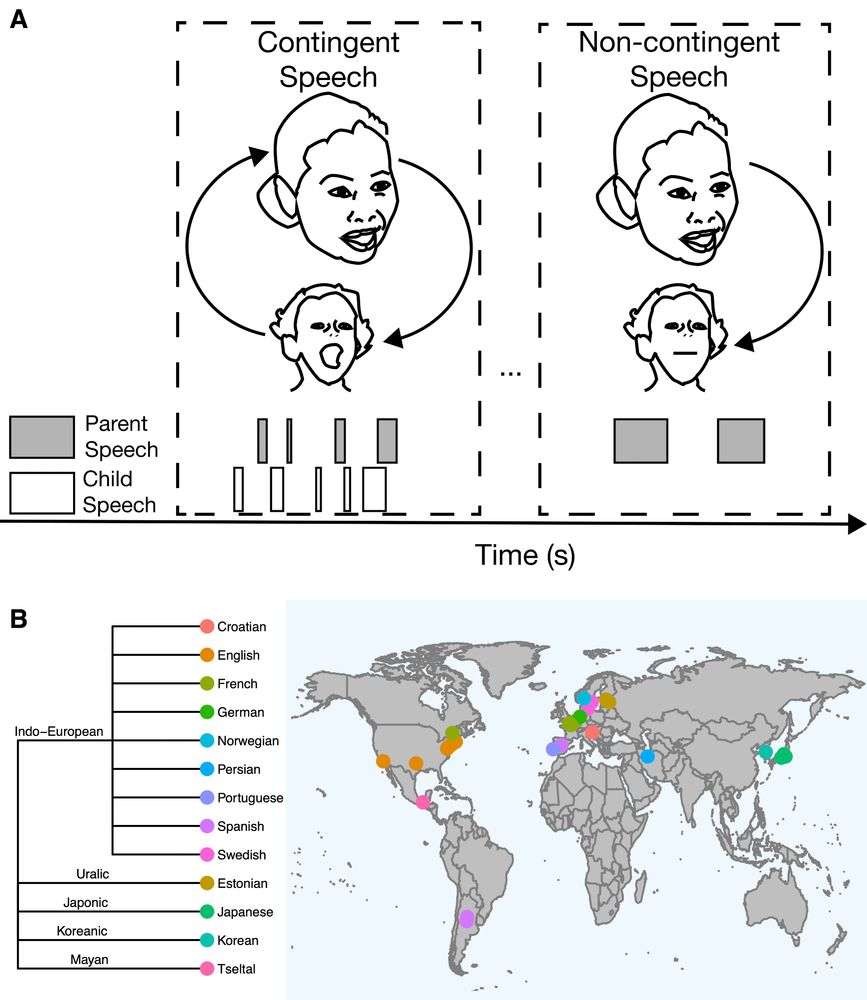
Only parental speech that was contingent (produced immediately following their children’s vocalizations) was simplified, even though both contingent and non-contingent speech were similar in child-directed exaggerated pitch. 4/9
06.02.2025 16:59 — 👍 1 🔁 0 💬 1 📌 0
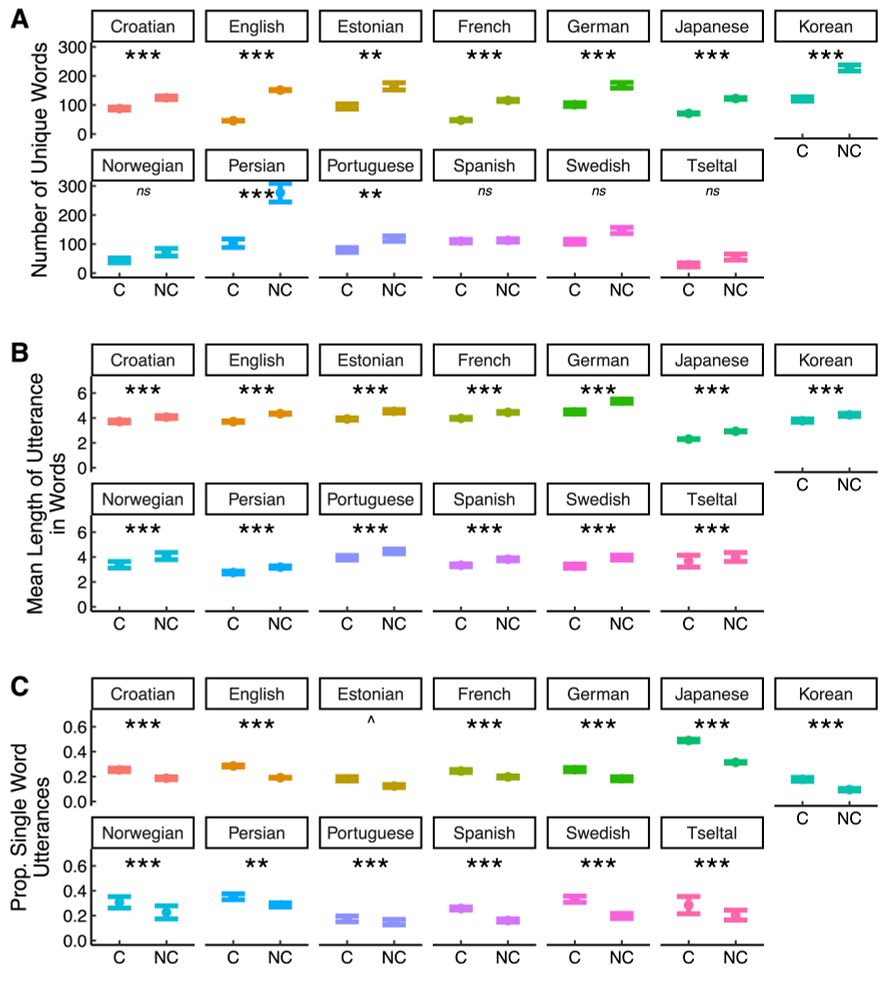
In response to their child’s immature speech, caregivers produce fewer unique words, shorter utterances and more single-word utterances compared to caregivers’ baseline speech complexity. We call this the simplification effect of contingent speech. 3/9
06.02.2025 16:59 — 👍 1 🔁 0 💬 1 📌 0
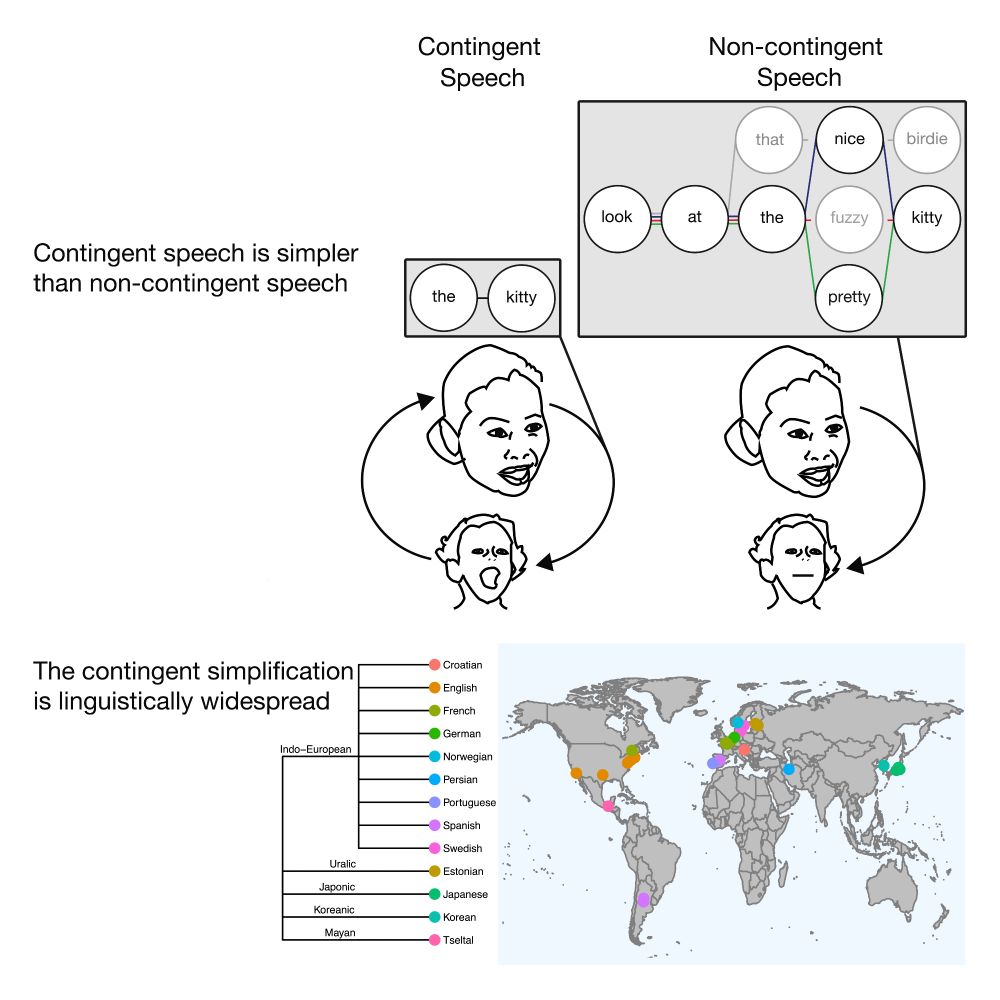
w/ @mikehgoldstein.bsky.social & Jacob Levy we show that children’s immature vocalizations & speech actively elicit language from caregivers that is linguistically simplified & more learnable. We find this in 13 languages, showing a robust social pathway for making language learning easier to do 2/9
06.02.2025 16:59 — 👍 1 🔁 0 💬 2 📌 0
We found a non-obvious pathway to robust language learnability across cultures & languages. Future work will assess just how widespread this pathway is across the world’s languages, and the role that contingent simplification plays in language development. 9/9
06.02.2025 16:46 — 👍 0 🔁 0 💬 0 📌 0
Languages don't only become learnable over evolution, they’re also learnable at precise moments during language development. Children actively shape their own learning input, eliciting learnable speech during vocal turn-taking, the central context of language use. 8/9
06.02.2025 16:46 — 👍 0 🔁 0 💬 1 📌 0
Languages must be learnable by the next generation, otherwise they would not exist. Here we show the simplification effect is robust across languages, contexts, and types of social interaction. Contingent simplified speech may be a cross-linguistic key to language learnability. 7/9
06.02.2025 16:46 — 👍 0 🔁 0 💬 1 📌 0

What this cross-cultural robustness implies is that the simplification effect of contingent speech is likely to be present in many more language than the 13 we studied in this paper. 6/9
06.02.2025 16:46 — 👍 0 🔁 0 💬 1 📌 0
A language we studied in this paper—Tseltal Mayan—was a particularly useful test case because Tseltal caregivers don’t use exaggerated child-directed speech typically found in industrialized societies. Despite this, we found a robust simplification in Tseltal caregiver speech. 5/9
06.02.2025 16:46 — 👍 0 🔁 0 💬 1 📌 0

Only parental speech that was contingent (produced immediately following their children’s vocalizations) was simplified, even though both contingent and non-contingent speech were similar in child-directed exaggerated pitch. 4/9
06.02.2025 16:46 — 👍 0 🔁 0 💬 1 📌 0

In response to their child’s immature speech, caregivers produce fewer unique words, shorter utterances and more single-word utterances compared to caregivers’ baseline speech complexity. We call this the simplification effect of contingent speech. 3/9
06.02.2025 16:46 — 👍 0 🔁 0 💬 1 📌 0

w/ @mikehgoldstein.bsky.social & Jacob Levy we show that children’s immature vocalizations & speech actively elicit language from caregivers that is linguistically simplified & more learnable. We find this in 13 languages, showing a robust social pathway for making language learning easier to do 2/9
06.02.2025 16:46 — 👍 0 🔁 0 💬 1 📌 0
Assistant Professor at University of Michigan
Studying hormonal, neural, and sensory basis of parental behavior in zebra finches.
Cognitive scientist, linguist and developmental psychologist. Studying language learning, language evolution, and the links between them. https://www.arnonlanguagelab.com/
Psychology, neurobiology of memory.
Assistant professor at Cornell, neuroscientist studying the neural circuits for vocal communication. Mom of 4 kiddos. Also, coffee, Will Ferrell, and bad sci-fi movies.
Cognitive scientist, philosopher, and psychologist at Berkeley, author of The Scientist in the Crib, The Philosophical Baby and The Gardener and the Carpenter and grandmother of six.
Semi-retired language development researcher at Stanford Psych and Stanford School of Medicine, MacArthur-Bates CDI Advisory Board, baseball fan
Interactional Linguist; Associate Professor in Communication and Language Development at Portsmouth University, passionate about language as coordination – especially its development, proud mum of two trilingual kids
Asst Prof UCSD Cognitive Science
language development | cognitive development | learning
https://mzettersten.github.io/
(he/his)
Cognitive Science at Aarhus Uni. Curious about social interactions, symbolic behaviors, and meta-science. Focus on stats, computational modeling, machine learning, complex systems, language, exp semiotics and neuropsychiatric conditions. He/They.
computational cognitive science he/him
http://colala.berkeley.edu/people/piantadosi/
I study language using tools from cognitive science and neuroscience. I also like snuggles.
Professor of Linguistics and UKRI Future Leaders Fellow at University of Birmingham, UK 🌈
❤️ Iconicity, R, open science, yoga, techno
Behavioral Scientist & Science Communicator.
Nancy and Peter Meinig Family Investigator in the Life Sciences and Associate Professor of Communication, Medicine, and Public Policy at Cornell University.
More here: neillewisjr.com
Personal account
Writer, journalist. Science, health. Pandemics, animals. Birder, photographer. Many words, some awards. AN IMMENSE WORLD, I CONTAIN MULTITUDES. Married to Liz Neeley, parent to Typo. he/him
📷 Canon R6mkii + RF 800mm
Edyong.me
Professor studying origins of concepts @CarnegieMellon; Brain development, cognition, evolution, math & logic; Primate Portal
@TIME 2017 Silence Breakers; she
Science Homecoming
@sciencehomecoming.bsky.social
Interested in vocal communication, corvid cognition, and comparative neuroscience. Postdoc at University of Tübingen with 2 cats. Enjoys fermentation and mushroom foraging in free time.
NIH K99 postdoc at Yale University in Dick Aslin's LLAMB Lab, studying statistical learning, memory, and language development. PhD: @Cornell @csl-lab

